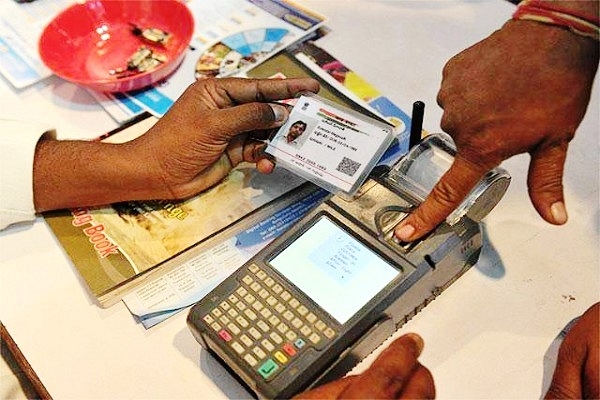
Keeping Private Businesses From Aadhaar Is A Bad Idea; Only Urban Naxals Will Rejoice
The majority judgment cripples the one element of Aadhaar which would have taken India one leap ahead of the world in platform technology.
By keeping Aadhaar valid only for public purposes like delivering subsidies and government benefits, the majority verdict needlessly messed up its commercial aspects.
The 4:1 verdict of the Supreme Court in favour of Aadhaar’s constitutional validity implies one gain and one loss: the gain is that it is now fully legal, subject to some checks, balances and exclusions. The loss is that the majority judgment cripples the one element of Aadhaar which would have taken India one leap ahead of the world in platform technology – a platform with 1.2 billion people with acknowledged identities on it. It relates to that part of the judgment which bars banks, telecom companies, and some others from using Aadhaar for their business needs.
This loss represents a victory for the fear-mongers, led equally by privacy advocates and Urban Naxals, whose only interest is disruption and anarchy, apart from assorted political naysayers, who will oppose the same thing that they may propose when in power. In the last group is the Congress party and P Chidambaram, who may well attempt to challenge the Aadhaar verdict a bit later using the dissenting judgment of Justice DY Chandrachud. The government needs to keep its powder dry for this fight, if it happens.
Chidambaram does not seem to realise that the Aadhaar bill, enacted by the National Democratic Alliance(NDA) using the “money bill” ruse to prevent a Rajya Sabha filibuster by the Congress, actually remedied the completely lawless nature of a project initiated by his government. But for the money bill, the current Supreme Court verdict would probably have gone the other way, rejected lock, stock and barrel.
By keeping Aadhaar valid only for public purposes like delivering subsidies and government benefits, the majority verdict needlessly messed up its commercial aspects. Perhaps the judges, led by outgoing Chief Justice Dipak Misra, were acutely aware that Justice Chandrachud was going to savage Aadhaar, and to maintain their own credibility, felt the need to ban something. Unfortunately, the axe fell on banks, telcos, and other such private sector users who have saved a packet on KYC by using Aadhaar.
The world of business is today dominated by platforms like Google, Facebook, Apple, Amazon and their Chinese counterparts Baidu, Tencent and Alibaba; Indian businesses have almost no chance against these giants, who have billions of dollars in cash to buy consumers and markets. Aadhaar, with more than a billion people on its proprietary platform, is the one single chance we have to make a mark. Without Aadhaar, it would have been impossible to create a potential telecom giant like Reliance Jio, which can stand up to these big platforms. Without Aadhaar, India’s UPI, RuPay, Bhim and other elements of the world’s most sophisticated payments system (probably the best outside China) will work far below their natural potential.
The world of technology is proprietorial by nature. India cannot win without government standing by the side of its businesses.
The fear that private parties can misuse Aadhaar and the big data it enables is valid – but only upto a point. The basic issue here is not misuse of data, but the lack of a strong privacy and data protection law. Once this kind of law is enacted, there is absolutely no need to prevent the private sector from accessing Aadhaar for their own ID and know your customer (KYC) requirements. In any case, it should be possible to build a tech bridge where ID authentications do not involve the actual transfer of user demographics to the private party. Where Aadhaar is needed is to enable a business to scale up in double-quick time at low cost; the private sector can build its own database over a longer period of engagement with customers, based on the same kind of consent a Google obtains from us.
In fact, bringing in the private sector can convert Aadhaar from being a mere cost centre to a profit centre, since it can charge the private sector for its ID services.
Aadhaar is ultimately not about subsidies and benefits; it is a huge business enabler. A potential multi-billion dollar platform if used commercially with adequate safeguards on privacy. For a country with so few enablers, is it foolish to let go of its one advantage in the pursuit of a fictitious concern for privacy, which can – and should - be addressed through a separate law.
The NDA government should study the Aadhaar verdict and work on two new laws: one to protect privacy and data, and the other to enable businesses. Arun Jaitley seems to have hinted about it yesterday (26 September).